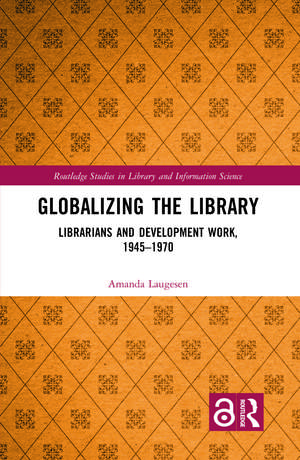Globalizing the Library: Librarians and Development Work, 1945-1970: Routledge Studies in Library and Information Science
Autor Amanda Laugesenen Limba Engleză Hardback – mar 2019
Globalizing the Library focuses on the globalization of information and the library in the period following the Second World War. Providing an examination of the ideas and aspirations surrounding information and the library, as well as the actual practices and actions of information professionals from the United States, Britain, and those working with organizations such as Unesco to develop library services, this book tells an important story about international history that also provides insight into the history of information, globalization, and cultural relations.
Exploring efforts to help build library services and train a cohort of professional librarians around the globe, the book examines countries in Asia, Africa, and the Pacific during the period of the Cold War and decolonization. Using the ideas of 'library diplomacy' and 'library imperialism' to frame Anglo-American involvement in this work, Laugesen examines the impact library development work had on various countries. The book also considers what might have motivated nations in the global South to use foreign aid to help develop their library services and information infrastructure.
Globalizing the Library prompts reflection on the way in which library services are developed and the way professional knowledge is transferred, while also illuminating the power structures that have shaped global information infrastructures. As a result, the book should be essential reading for academics and students engaged in the study of libraries, development, and information. It should also be of great interest to information professionals and information historians who are reflecting critically on the way information has been transferred, consumed, and shaped in the modern world.
Preț: 998.71 lei
Preț vechi: 1217.94 lei
-18% Nou
191.12€ • 199.78$ • 161.50£
Carte tipărită la comandă
Livrare economică 07-21 martie
Specificații
ISBN-10: 0815370032
Pagini: 188
Dimensiuni: 156 x 234 x 13 mm
Greutate: 0.41 kg
Ediția:1
Editura: Taylor & Francis
Colecția Routledge
Seria Routledge Studies in Library and Information Science
Locul publicării:Oxford, United Kingdom
Public țintă
PostgraduateCuprins
Notă biografică
Descriere
Globalizing the Library focuses on the globalization of information and the library in the period following the Second World War. Providing an examination of the ideas and aspirations surrounding information and the library, as well as the actual practices and actions of information professionals from the United States, Britain, and those working with organizations such as Unesco to develop library services, this book tells an important story about international history that also provides insight into the history of information, globalization, and cultural relations.
Exploring efforts to help build library services and train a cohort of professional librarians around the globe, the book examines countries in Asia, Africa, and the Pacific during the period of the Cold War and decolonization. Using the ideas of 'library diplomacy' and 'library imperialism' to frame Anglo-American involvement in this work, Laugesen examines the impact library development work had on various countries. The book also considers what might have motivated nations in the global South to use foreign aid to help develop their library services and information infrastructure.
Globalizing the Library prompts reflection on the way in which library services are developed and the way professional knowledge is transferred, while also illuminating the power structures that have shaped global information infrastructures. As a result, the book should be essential reading for academics and students engaged in the study of libraries, development, and information. It should also be of great interest to information professionals and information historians who are reflecting critically on the way information has been transferred, consumed, and shaped in the modern world.











